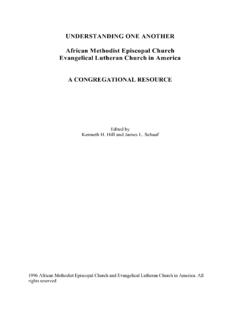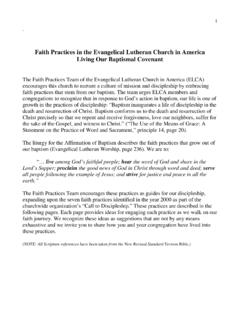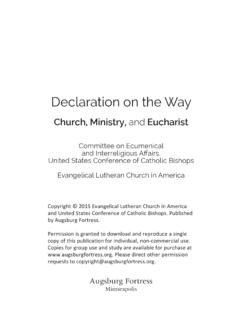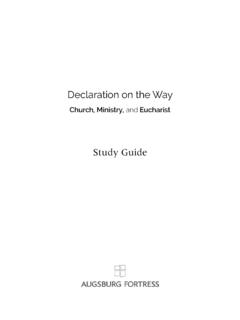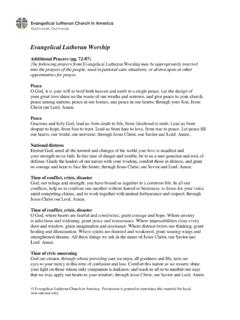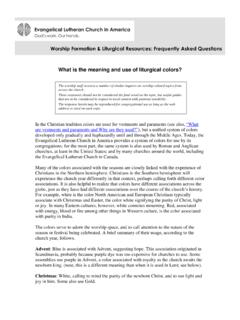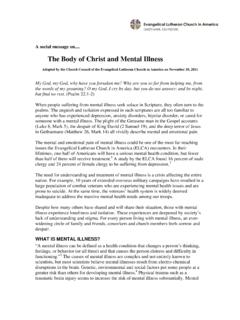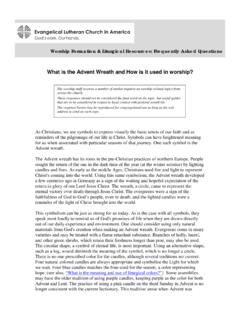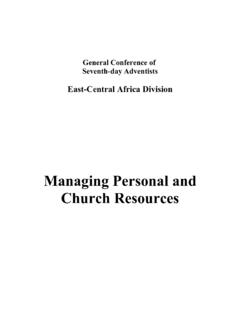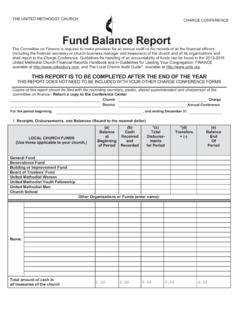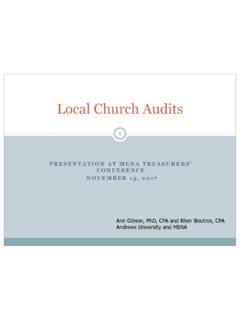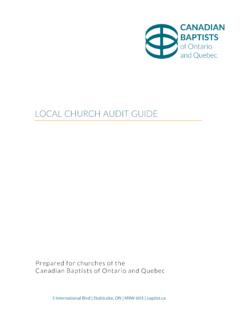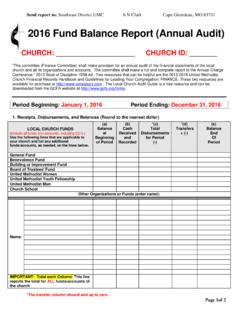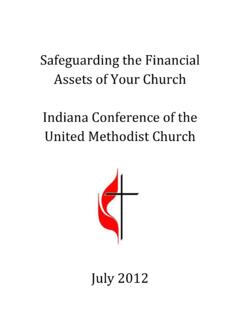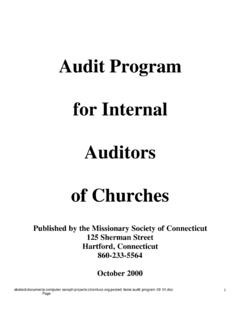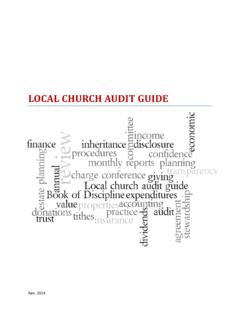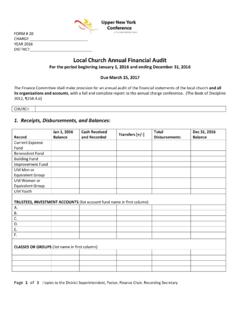Transcription of Congregational Audit Guide 7-11-17 - ELCA Resource …
1 Congregational Audit Guide A Resource provided by the Office of the Treasurer of the Evangelical Lutheran church in America This Guide is prepared for So then, each of us will be accountable to God. (Romans 14:12) We intend to do what is right, not only in the Lord s sight, but also in the sight of others. (2 Corinthians 8:21) Who then is the faithful and prudent manager? (Luke 12:42) Give me an accounting of your management. (Luke 16:2) THE CONGREGATIONS OF THE EVANGELICAL LUTHERAN church IN AMERICA 5 DISCLAIMER 5 Congregational Audit Guide FORMAT 5 WHAT IS AN Audit ? 6 WHY WOULD A CONGREGATION WANT AN Audit ? (OR DON T YOU TRUST OUR MEMBERS AND STAFF? ) 7 DO I HAVE TO BE A CPA TO UNDERSTAND Congregational AUDITING? WHO CAN PERFORM AN Audit ? 7 WHEN SHOULD A CONGREGATION HAVE AN OUTSIDE Audit ? 9 WHAT DOES AN Audit DO? 9 WHAT ABOUT AUDITING MONEY HELD BY GROUPS WITHIN THE church ?
2 10 WHAT ABOUT CONFIDENTIAL INFORMATION AND RETENTION? 10 WHEN IS A CONGREGATION Audit BEST CONDUCTED? 10 HOW DOES THE ACTUAL Audit PROCESS BEGIN? 10 WHAT IS THE AUDITOR S REPORT? 11 HOW AND WHEN IS THE Audit REPORT PREPARED? 11 EXHIBIT I: Congregational Audit PROGRAM 12 EXHIBIT II: STANDARD FORM TO CONFIRM ACCOUNT 23 EXHIBIT III: STANDARD FORM TO CONFIRM DONOR CONTRIBUTION INFORMATION 24 EXHIBIT IV: ANNUAL Audit REPORT 25 Preface Congregational Audit Guide A Resource provided by the Office of the Treasurer of the Evangelical Lutheran church in America Page 5 of 27 Last Updated: August 2017 The latest version of this document can be found at: #FinanceC Preface DISCLAIMER The ELCA Churchwide Organization is pleased to provide this Resource but is not responsible for the conduct of Congregational audits, nor does it provide legal or financial advice to congregations through this Resource . Congregations should seek assistance and advice from their local advisors when specific issues arise.
3 This Resource is provided to you as a service; it should be used to increase knowledge of auditing principles within your congregation, including the understanding of why audits should be conducted and the uses to which they can be applied by officials of the congregation. ELCA congregations and ELCA entities have permission to use and reproduce this Resource as long as attribution is given. Congregational Audit Guide FORMAT We will use a question and answer format in presenting the information provided in the following pages. We have tried to present questions and issues we ourselves have asked or have been asked by others. Congregational Audit Guide A Resource provided by the Office of the Treasurer of the Evangelical Lutheran church in America Page 6 of 27 Last Updated: August 2017 The latest version of this document can be found at: #FinanceC What is a Congregational Audit ? This is a practical, working definition of an Audit for the congregation: A Congregational Audit is an independent evaluation of the financial records and the internal controls of the congregation for the purposes of providing an opinion on the reasonableness of the congregation s financial statements and recommending improvements to its internal controls.
4 An Audit involves completing a set of procedures that in the judgment of the auditor will present the evidence or information needed to provide an opinion on the financial statements of the congregation. These procedures also provide insight as to whether a congregation s internal controls are adequate. Who should perform the Audit ? Congregations vary greatly in size, ministries, resources and budgets. For many congregations, it is highly advisable to have a professional Audit conducted by a qualified independent accounting firm; others, due to cost considerations, may wish to have an independent member(s) of the congregation with accounting or financial backgrounds perform the Audit . If the congregation determines that it is not economical to have an external Audit every year, then it might weigh the cost/benefit of having an external Audit performed on a two- or three-year cycle with an internally-staffed Audit performed in the interim years. Professional financial auditors (Certified Public Accountants, or CPAs) follow professional standards in conducting their audits.
5 Exhibit I provides some suggested Audit procedures that can be used by the congregation in performing its own Audit when retaining the services of a professional Audit firm is neither required nor feasible. To a professional auditor or accountant, how we have laid out the Congregational Audit may be closer in professional jargon to a review. Audit judgment involves determining which and to what extent these procedures should be applied in reviewing each area. The materiality ($ size) of each area is a key consideration in making these judgments. Who should oversee the Audit ? The ELCA Model Congregation Constitution states that the Congregation Council shall be responsible for the financial and property matters of this congregation. The Model Constitution provides for an Audit Committee: An Audit Committee of three voting members shall be elected by the Congregation Council. Audit Committee members shall not be members of the Congregation Council. Term of office shall be three years, with one member elected each year.
6 Members shall be eligible for reelection. Congregational Audit Guide A Resource provided by the Office of the Treasurer of the Evangelical Lutheran church in America Page 7 of 27 Last Updated: August 2017 The latest version of this document can be found at: #FinanceC It does not specify what kind of work an Audit committee must do. Nor is there any requirement that the Audit be performed by a professional, that it conform to generally accepted auditing standards, or that it be prefaced by the usual representations and caveats that auditing firms incorporate into their audits. Congregations vary greatly in size, ministries, resources and budgets. An Audit committee is meant to provide the oversight necessary to promote a strong control environment and to afford reasonable assurance that good stewardship is being used in handling and accounting for the funds and other assets of the congregation. Congregational Audit Guide A Resource provided by the Office of the Treasurer of the Evangelical Lutheran church in America Page 8 of 27 Last Updated: August 2017 The latest version of this document can be found at: #FinanceC Why would a congregation want an Audit ?
7 (Or Don t you trust our members and staff? ) There are all kinds of related questions asked about why a congregation should have an Audit , including: Why would a small church with a tiny budget need an Audit ? Why would a big church with lots of controls in place and with a full staff of professional administrators need an Audit ? Why waste the time or the money, or both, on an Audit when everybody knows the church treasurer is as honest as the day is long? Conducting an Audit is not a symbol of distrust. It is a mark of responsibility. It is good stewardship demonstrated for all to see. It is a message to congregation donors that you care about their gifts. There are many reasons for annual audits. For example, an annual Audit : Is the best way we know of protecting the individuals the congregation elects to offices of financial responsibility from unwarranted charges of careless or improper handling of funds; Protects the congregation s reputation and builds the trust and confidence of the financial supporters of the church in the way their money is being accounted for (trust and confidence lead to improved patterns of financial support); Sets habits of fiscal responsibility to assure that when there is turnover in personnel there will be continuity in accountability and nothing will fall through the cracks.
8 Do I have to be a CPA to understand Congregational auditing? No. A person with some familiarity with Congregational financial records and some basic accounting practices can perform many of the Audit procedures. Congregations throughout the ELCA do a great job of fulfilling their responsibilities to make provisions for an annual Audit without the benefit of formal training in accounting or fiscal management, whether it s an Audit by outside professionals, or whether it s by some person in the congregation or neighboring church with financial knowledge or expertise. The Audit program found in Exhibit I is provided to help you. Who can perform a Congregational Audit ? Generally, a person who is qualified to perform a Congregational Audit will have some experience with accounting principles and records, gained through bookkeeping, office management or accounting courses. The person must have the time to devote to the Audit and be willing to follow through on different requests for information and to complete the procedures and reporting in the Audit program (Exhibit I) provided in this booklet.
9 Sometimes a small congregation will agree with another small congregation in the same area to have the treasurer of each Audit the other. Often congregations have accounting professionals among their members who are not serving that congregation in any of its financial functions who may be willing to perform the Audit as a donation of services. Congregational Audit Guide A Resource provided by the Office of the Treasurer of the Evangelical Lutheran church in America Page 9 of 27 Last Updated: August 2017 The latest version of this document can be found at: #FinanceC When should a congregation have an outside Audit (CPA) firm perform its Audit ? Congregations with annual receipts in excess of about $400,000 should seriously consider engaging an outside auditing firm to perform the Audit . This is a recommendation and is not binding, but is prudent stewardship since more complexity is involved as receipts and expenditures become larger. Even if a congregation feels the Audit expense is too great to do every year, they should set an every other year or every third year pattern, budget for it, and stick to it.
10 What does an Audit do? An Audit should: Verify the reliability of the financial statements, including procedures to: o Independently verify the integrity of the reports of the treasurer(s); o Provide assurance that receipts are properly safeguarded, deposited in a timely manner, and properly classified in the financial statements; o Independently verify the existence of cash and accounts receivable and that all bank accounts are reconciled on a monthly basis by someone who is not allowed to write checks; o Independently verify the amount of indebtedness; o Ensure that expenses are properly supported and approved; o Verify that donated and earned funds of the congregation have been used and recorded as stipulated by the donors. Evaluate the effectiveness of key financial controls such as accounting controls (systems that reduce the possibility of loss or errors); Evaluate segregation of duties (assurances that more than one person is involved in critical steps in handling money so that there can be checks and balances); Evaluate reasonableness of systems and procedures in the light of all factors, including the size of the congregation and its budget; Assure adequacy of insurance coverage; Establish systems for retaining and accessing meeting minutes that have financial implications ( , Finance Committee, Trustees, Congregation Council); and Verify records that show donors stipulations for the use of gifts made to the congregation.

